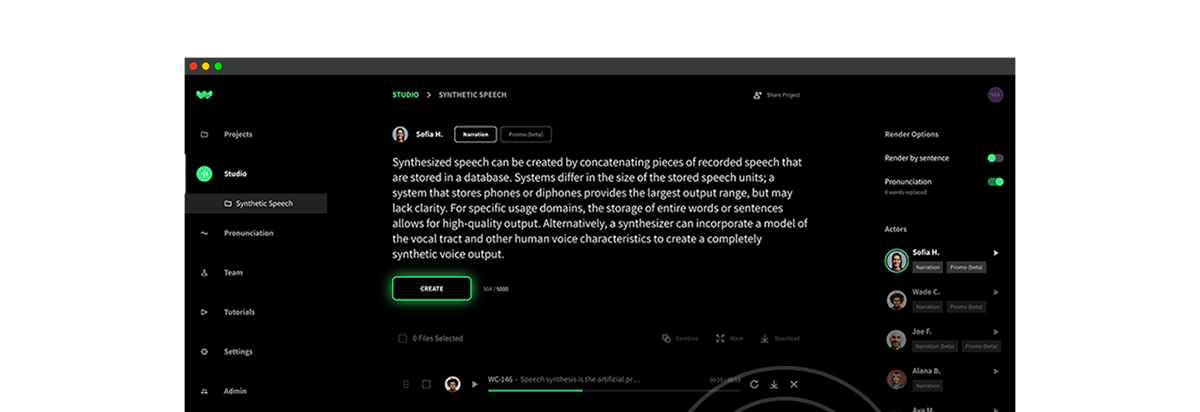A unified brand identity is more important than ever in our new immersive experiences and synthetic voice or voice cloning are powerful tools. Marketing services or products through a single channel no longer makes the cut; successful companies reach customers through podcasts, banner ads, social media posts, sponsored content, and more.
With so many different ways to find new audiences and buyers, brands need a recognizable and consistent identity. And because these massively popular new mediums are audio-only — like podcasts or music-streaming services — it’s not enough to only have a good logo or visual design.
Brands need an audio identity, too. By using a consistent voice across all marketing and services, companies build trust with customers and unify their brand image (and sound). Synthetic voice and voice cloning software are great options.
The need for reliable, affordable brand audio goes further than marketing and retail industries. Publishers and authors voice audiobooks. Tech brands build voice assistants into products. Businesses and schools need training and educational materials spoken aloud. With the demand for narration and audio work, the popularity of synthetic voices is skyrocketing.
Human voice actors bring emotion and personality to their recordings. However, brands don’t always have the time or budget necessary to schedule multiple voice actors, recording studios, re-takes, and post-production. As text to speech technology sounds more realistic, voice cloning and speech synthesis come closer than ever to the real thing — providing high-quality narration and convincing audio options for brands, educators, authors, and more.
Let’s take a closer look at how synthetic voices and voice cloning work: the applications, best use cases, benefits and concerns to be aware of.
What Is Synthetic Voice?
Artificial intelligence and advanced software tools can successfully synthesize a natural-sounding human voice nearly indistinguishable from real humans.
With synthetic voices, the potential accents, traits, and tones are limitless. For example, for a navigation app, a brand may look for the clearest and least distracting voice. In contrast, an author may aim for a more specific and emotive tone for an audiobook recording. Instead of traditional voice production, companies can create their own custom voice and center their brand image around it.
Modern synthetic voice technology has evolved from older “computerized” sounding voices, like the speech system used by Professor Stephen Hawking. These days, machine learning has led to vast improvements in realism and human parity. Artificial intelligence is trained to create the voice through extensive human voice recordings and voice data. The best synthetic voices now track much closer to reality, so much so that the average listener can’t tell the difference between a human voice actor or a high-quality synthetic voice.
What Is Voice Cloning?
Some people use the terms synthetic voice and voice cloning interchangeably. However, there is a difference.
Voice cloning refers to a virtual version of a real, individual person’s voice. Instead of using machine learning and several studio sessions to synthesize a new voice avatar, voice cloning matches a specific person’s voice. Then, the simulation of their voice becomes available for narration and text-to-speech. Voice cloning is useful when an individual is unavailable for any reason or too busy to update recordings. It’s an excellent way to let talent do what they do best, while capturing their voice for media spots, commercials, or audiobooks.
Voice cloning happens for many different reasons. Maybe a documentary or film wants to recreate a late star’s voice. An overbooked voice actor could use a cloned voice for updates and recordings. This technology opens up new opportunities but also presents tough ethical questions. We’ll touch more on those later.
Text-to-Speech and Synthetic Voice
Synthetic speech is created by one of these two systems: text-to-speech or speech-to-speech.
A text-to-speech system converts text into audio using a synthetic voice. Through artificial intelligence and neural networks, the resulting voice is clear and easily adaptable. This works perfectly for a wide array of applications, from pre-scripted voiceover to API-enabled real-time applications.
The text-to-speech system learns by looking at huge data sets of voices, texts, and samples. The resulting voice mimics the audio recordings used in training, making text-to-speech voices customizable.
Use Cases for Synthetic Voice
Synthetic voices and voice cloning fit with many different industries and applications. Here are some of the popular use cases.
Voice Talent
Voice actors and performers can replicate their own voices, allowing them to book more work than ever before. Their recognizable voices can be translated into different languages and dialects, opening up new opportunities and sources of income. This is especially useful when an announcement or advertisement needs regional changes or updates. Instead of recording new versions constantly, narrations are customizable without losing the same voice.
Education
Synthetic voices have many different applications in the world of education. Teachers can connect with students across the globe, using synthetic versions of their voice to speak other languages seamlessly. Students with trouble speaking or communicating could be free to join in discussions, connecting with teachers and classmates.
Corporations also use synthetic voices to create compelling training material. Adding voiceover to a slide presentation enhances the amount of information that a new employee can absorb in a remote location. Some companies even choose to create a custom voice of their CEO or beloved founder to add a branded experience to their onboarding.
Audiobooks
Audiobooks are more popular than ever, with online services providing thousands of books. With synthetic voice narration, books are read with the author’s voice or other cloned recordings. On the other hand, publishers and authors can create fast and affordable audiobooks with synthetic voice technology.
Customer Service
Through synthetic voices, customer support centers can cut down wait times and assist more customers. As this technology gets better and better, these customer service voices sound more convincing than ever.
These applications extend past the annoying automated “press 3 to pay your balance” phone trees of the past. Synthetic voice customer service is powerful when used on websites, self-service kiosks, or in a mobile app. The possibilities are nearly endless and new voice user interfaces in customer service are emerging every day.
Branding and Marketing
Brands unify their message by using the same literal and figurative voice throughout ads and videos. Relying on a specific voice actor can be risky. Future business arrangements, opinions, or actions could conflict with a company’s interests. By creating a unique voice, brands can build trust with customers by using the same voice and tone without risking future changes.
Concerns About Voice Cloning and Deepfakes
While there are clear upsides to using synthetic voices and clones, clear risks and challenges exist. Voice actors and performers are rightfully worried about their audio likenesses being used without their express and total consent. Legal protections must be in place to protect ownership of individual voices. This protects voice actors and ensures they are paid correctly.
Another major issue is deepfaking. Through voice cloning, a person’s voice can be synthesized and manipulated. As celebrities and politicians become easy to impersonate, dangerous possibilities open up. Scandals or political affairs could be created out of false impersonations. We need strong safeguards here, exposing fake recordings before they cause real world damage. This is a tough line to walk as technology improves.
At WellSaid Labs, we’ve been explicitly clear with the types of content we allow on our platform, prohibiting deep fakes and other malicious content.
RELATED: AI for Good–Content Moderation at WellSaid Labs
Future of Synthetic Voice and Voice Cloning
Many people are already listening to synthetic voices, and may not even realize it. Consumers have access to high-quality audiobooks, marketing tools, online education, and more. While there are hurdles to navigate regarding regulations and protection, synthetic voice technology opens up opportunities for all industries — and voices — to be heard.

